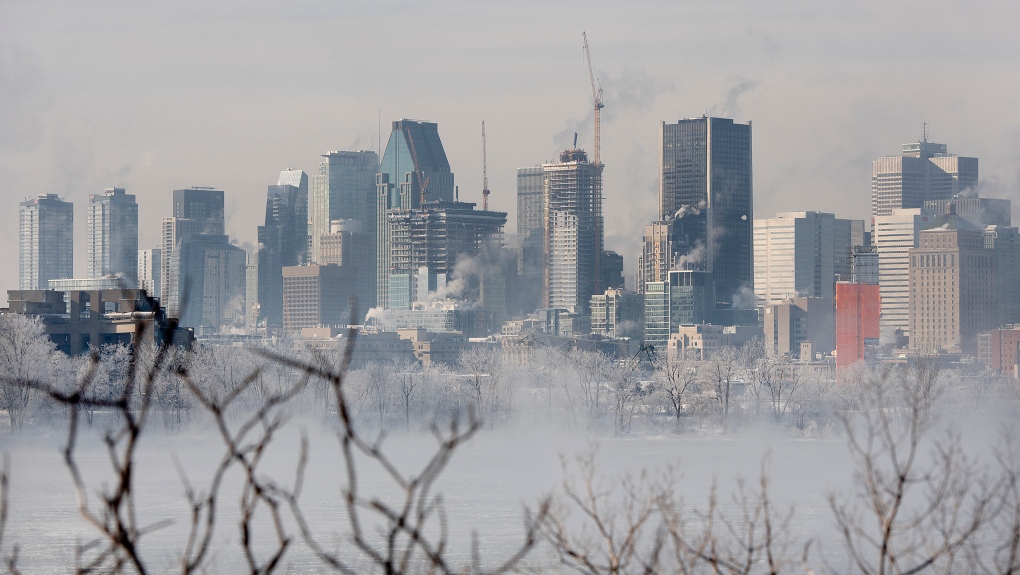Temperatures not as bitter cold, but smog remains in Quebec
 Ice fog rises off the St. Lawerence River in Montreal, Saturday, Jan. 22, 2022. Environment Canada has issued an extreme cold warning for the region. THE CANADIAN PRESS/Graham Hughes
Ice fog rises off the St. Lawerence River in Montreal, Saturday, Jan. 22, 2022. Environment Canada has issued an extreme cold warning for the region. THE CANADIAN PRESS/Graham Hughes
The good news: it's not as cold outside.
The bad news: it's smoggy.
A smog warning remains in effect in Montreal, Quebec City and other regions of the province on Sunday.
Environment and Climate Change Canada (ECCC) issued a warning Saturday morning and Sunday said the "high concentrations of pollutants will continue" 24 hours later.
ECCC is recommending that asthmatic children and people with respiratory issues or heart disease avoid intense physical activity outdoors.
"We can all help improve air quality by doing simple things, such as limiting the use of fireplaces and wood-burning stoves, opting to use public transit, reducing our driving speed and not letting our car engines idle unnecessarily," ECCC writes in its warning.
ECCC adds that wood heating is the main source of the particles that contribute to winter smog, and Montreal residents should stop using wood-burning stoves or fireplaces until the warning has been lifted.
Temperatures will hover near -10 Celsius in Montreal with a 60 per cent chance of flurries.
CTVNews.ca Top Stories

B.C. tenants evicted for landlord's use after refusing large rent increase to take over neighbouring suite
Ashley Dickey and her mother rented part of the same Coquitlam duplex in three different decades under three different landlords.
MPP Sarah Jama asked to leave Ontario legislature for wearing keffiyeh
MPP Sarah Jama was asked to leave the Legislative Assembly of Ontario by House Speaker Ted Arnott on Thursday for wearing a keffiyeh, a garment which has been banned at Queen’s Park.
Mountain guide dies after falling into a crevasse in Banff National Park
A man who fell into a crevasse while leading a backcountry ski group deep in the Canadian Rockies has died.
Montreal actress calls Weinstein ruling 'discouraging' but not surprising
A Montreal actress, who has previously detailed incidents she had with disgraced Hollywood producer Harvey Weinstein, says a New York Court of Appeals decision overturning his 2020 rape conviction is 'discouraging' but not surprising.
Saskatchewan isn't remitting the carbon tax on home heating. Why isn't my province following suit?
After Prime Minister Justin Trudeau said the federal government would still send Canada Carbon Rebate cheques to Saskatchewan residents, despite Saskatchewan Premier Scott Moe's decision to stop collecting the carbon tax on natural gas or home heating, questions were raised about whether other provinces would follow suit. CTV News reached out across the country and here's what we found out.
Expert warns of food consumption habits amid rising prices
A new survey by Dalhousie University's Agri-Food Analytics Lab asked Canadians about their food consumption habits amid rising prices.
Charlie Woods, son of Tiger, shoots 81 in U.S. Open qualifier
Charlie Woods failed to advance in a U.S. Open local qualifying event Thursday, shooting a 9-over 81 at Legacy Golf & Tennis Club.
Caleb Williams goes to the Bears with the No. 1 overall pick in the NFL draft
Caleb Williams is heading to the Windy City, aiming to become the franchise quarterback Chicago has sought for decades.
Body of Quebec man who died in Cuba found in Russia, family confirms
A Montreal-area family confirmed to CTV News that the body of their loved one who died while on vacation in Cuba is being repatriated to Canada after it was mistakenly sent to Russia.

































